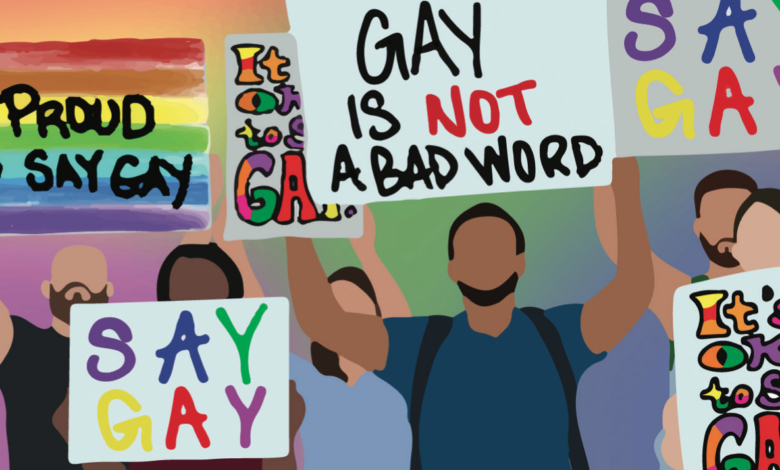
The pain brought on by Florida’s ‘Dont Say Gay Bill’
By Jay Roberson
On March 8, the “Don’t Say Gay Bill” was passed by Florida Gov. Ron DeSantis. This extreme anti-LGBTQ+ law was placed into effect in schools across Florida in order to prohibit teachers from speaking about gender identity or sexuality. As a non-binary lesbian and a future educator, I remember the fear I felt when I read the news and saw that it had passed.
Never did I think that I would read a similar article later in the year stating that the Republican Party is attempting to pass a nationwide law prohibiting the discussion of any LGBTQ+ matter in classrooms of children ages 10 and under.
My gender identity and sexuality have always been something that I struggled with, but now that I am secure in my queer identity, I am proud of who I am. It took me a long time to find security and comfort in my labels, so the fact that they are trying to erase my identity from classrooms across the country is incredibly upsetting.
The original bill that was passed in Florida states, “Classroom instruction by school personnel or third parties on sexual orientation or gender identity may not occur in kindergarten through grade 3 or in a manner that is not age-appropriate or developmentally appropriate for students in accordance with state standards.”
Not only is this detrimental to students, but to LGBTQ+ educators who are unable to speak about their identity in class. To make matters worse, on Oct. 18 it was released that U.S. Rep. Mike Johnson is attempting to pass the “Stop The Sexualization of Children Act,” which is essentially a nationwide version of the “Don’t Say Gay Bill.”
Republicans who are supporting this bill are hoping to “protect children” by federally defunding any events or organizations that are LGBTQ+ based; however, this is not protecting children. If anything, this bill will negatively affect children who are questioning their gender identity or sexuality.
Erasing the topic of the LGBTQ+ community in classrooms will only leave room for more ignorance due to a lack of education. Throughout middle and high school, I was never brave enough to come out as lesbian or non-binary because of the backlash I would have received. This is partly due to the fact that the LGBTQ+ community was rarely brought up in class.
We were given health classes and sex education, but rarely did my teachers utter a word about LGBTQ+ people within those lessons. The only time I remember discussing the topic of the LGBTQ+ community was in my senior year health class where they debated the validity of being transgender.
Considering I had just started to come to terms with being non-binary, I felt extremely unsafe in that classroom as students debated the existence of transgender people. This is not the first time I have heard this debate, though.
It feels like every time my human rights are brought up, an argument comes along with it. I started observing classes at a middle school this semester, and I’m starting to really love teaching.
Not every part of it is easy though. I’m not a Miss or Mr. I told my co-op teacher that I’m non-binary and want to be called Teacher Roberson, to which they replied, “We’ll have to see what the school says, [but] that might be controversial around the kids.”
Then, they informed me that kids may not accept me or purposely misgender me. This is something that I’ve become accustomed to due to my identity, primarily from the adults who have issues adapting.
When I tell people I’m a part of the LGBTQ+ community and use they/them pronouns, they feel like they’re entitled to give me advice or just pretend that part of me doesn’t exist. These people really don’t know me at all, though. I’m a copy editor at The Rider News. I’m a peer leader in the Multicultural Student Leadership Institute. Most importantly, I’m non-binary and a future educator. I hope to leave a good impact on future generations. This bill not only invalidates all LGBTQ+ people; it erases the LGBTQ+ community across the country.



